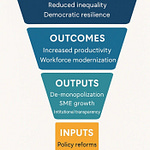1. Clientel ethnocapitalism in Malaysia refers to the exchange of resources, favours, and political support between elites and their ethnic communities. The ruling coalition specifically applies patronage to secure political loyalty, particularly from the Malay majority.
2. This is a form of class control that diverts attention from class struggle by emphasizing ethnic identity involving identity politics. The state facilitates this ethnic-based patronage as a way of maintaining power, with economic policies like the New Economic Policy (NEP) benefiting targeted and preferred ethnic groups while perpetuating class inequalities.
3. By focusing on ethnic differences, the political elite prevents the emergence of a cross-ethnic working-class solidarity. This is done by emphasising the ethnic benefits of the Malay community (through an affirmative action and state contracts whereby wealthy disproportionately from government contracts, creating a dual class structure) while maintaining a broader exploitative capitalist structure that disadvantages the working classes of all ethnicities.
4. The other means are by Hegemoning an Ideological control which is a process of “intellectual and moral leadership” embedded in the ruling class that maintains power not only through economic means but also by controlling the ideological apparatus (education, media, and religious institutions).
5. The promotion of Malay Islamic values and Malay nationalism serves to legitimize the existing social order and distract from class-based grievances. In this sense, the ethnic identity politics in Malaysia functions as a form of ideological control that reinforces capitalist exploitation while preventing true class consciousness from emerging, that is, the state can, and will, serve the ruling class.
6. The state’s intervention through policies like the NEP, could be seen as an attempt to legitimise capitalism through ethnic redistribution. It creates a new Bumiputera bourgeoisie who controls key sectors of the economy – in civil service, armed forces and GLCs – while leaving structural economic exploitation largely intact.
7. Malaysia’s economic structure is integrated into the global capitalist system. Malaysia as a peripheral economy, dependent on foreign investments and global markets for its economic growth. By this process, the emphasis on ethnic politics only serves to obscure the real dependency on global capitalism, where Malaysian elites (of all ethnicities) benefit from this system while the working class remains marginalised. Among the non-Malay elites, the types of Tan Chong, Oriental, YTL, Berjaya Group, and Genting have benefited.
8. Within the Malay community, affirmative action has created structural and socio-economic barriers that disadvantage other portions of the community, particularly the rural poor and those without political connections.
Some of these identifiable fault lines:
a) disproportionately do affirmative initiatives benefited the urban and middle/upper-class Malays rather than the rural or lower-income populations.
Scions of a Malay middle-class family often not only go to privilege boarding schools, but attend top-notch universities abroad, while poor family’s children attend arabic madarass school and become ustaz/ustazah that bound their generations in religious compounds than to face reality challenges of the corporate world;
b) cohorts of small elite, politically connected Bumiputeras, became extremely wealthy, while the poorer segments of the community saw little improvement. This led to a widening income and wealth gap within the Malay population itself;
c) affirmative action policies created a sense of dependency on government handouts, subsidies, and public sector jobs, which discouraged entrepreneurship and competitiveness within the Malay community;
d) preferences in education, jobs, and contracts based on ethnicity lead to a mismatch between job holders and their qualifications besides slacking in knowledge-acquisition and skill-deployment that unnecessarily deprive expertise or competitiveness on how things work and or to solve problems;
e) long term, affirmative action policies not only failed on wealth redistribution, it clashed with the need for broader social reforms, such as improvements in education quality and access to better healthcare for everyone.
9. One shall maintain that clientel capitalism, particularly clientel ethnocapitalism is no more than a legacy reconstruct of neocolonialism.
10. On one hand, ethnic clientelism sustains the illusion of empowerment for the Malay majority, while on the other pedestal, leaving the structural inequalities of capitalism largely unchallenged.
CONCLUSION
With present economic superstructure remaining dependent on global financial monopoly-capital, and whilst domestic politics are manipulated through ethnic perceptions and employment divisions to prevent meaningful challenges to the existing capitalist system, there is much ahead to deconstruct and change the existing politico-economic situations.
a podcast production by












